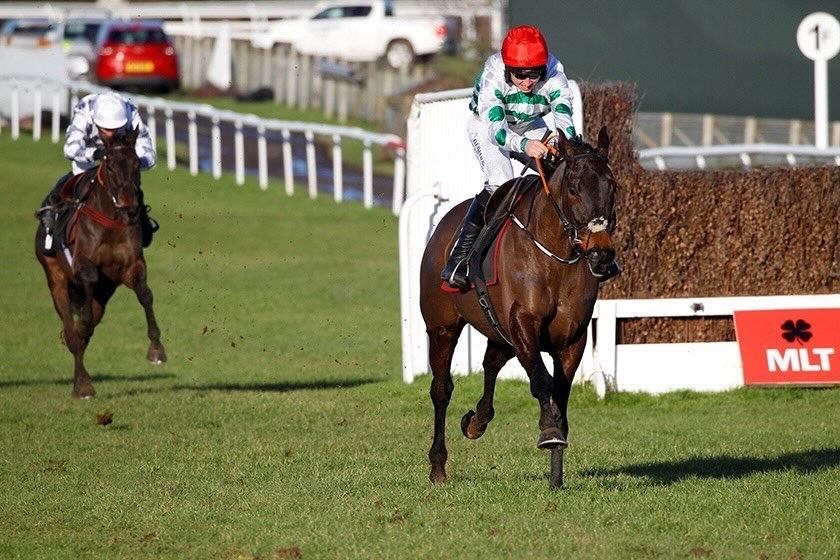“To do it at Haydock, the course where I had been many times as a kid watching racing, to ride a winner there… not only for me but the owners who sponsor me and everyone else…it was a great day.”
The words of young scouser Lewis Stones, powering over the finish line to win at Haydock Park in December – his hometown track.
Riding to one of the most inform trainers this year, Olly Murphy, Stones told Merseysportlive about his journey from Merseyside to becoming a professional jockey.
December 1st rolled around and Stones sat on the M6, journeying from his adopted home town of Stratford-upon-Avon, back to his childhood home of Merseyside, dreaming of a winner at a place so special to him.
Aboard Macho Mover, with a starting price of 9/2, the local jockey was always optimistic, but admitted it wasn’t smooth sailing during the 3 mile trip.
“I had finished second that many times this year, going down the back straight down, I thought, I’m beat here. But I just thought if I can just keep with them, I knew he’d finish strong.”
Rounding the final corner and into the home straight, Stones knew it was now or never.
“I jumped the last and hit the front but all that was going through my head was, I think something is going to come and do me here and I will probably finish second again, but to hold on was good.”
A first ride at Haydock, and a first winner there. A special day for a boy who only 10 or so years previous, was a fan in the stands on race day.
It was certainly a surprise to the Stones family having a son who would go onto become a professional jockey in his early 20s.
“I’ll be truthful and honest with you, my family had absolutely no connections with horses, whatsoever.
“My mum is a schoolteacher, and my dad is an engineer. My dad had an interest in horse racing, and he would always take me.
“I grew up in Ellesmere Port on the other side of the Mersey, we’d go to local tracks like Chester, Bangor, Haydock and Aintree whenever they were on.
“From then on, I don’t know what it was, but I always wanted to become a jockey.”
The journey began for Stones at Doncaster racing school at 16, having ridden ponies as a kid.
“My mum made sure I got my GCSEs in case it went wrong, something to fall back on.
“I moved there and did a three-month course which puts you on the road to work in racing and nine years later I’m still doing it now.”
After finishing in Doncaster, Stones found local trainer, Mick Mullineaux, who was looking for a member of staff.
“He was good because he gave me a first leg up really, he was key for me getting my riding licenses which I was keen to do as well.
“He helped me along the way, in terms of getting my licenses and getting ready to ride.
“Probably being honest with you I was nowhere near ready, but he was willing to support me.”

Three and a half years later, Stones moved away from Merseyside and down to Olly Murphy’s yard.
‘I wanted to try somewhere new, Olly looked like an upcoming trainer who was going places, and I thought I’ll give it a stab down there and he was a jump trainer and I wanted to ride over jumps, so I thought if it works it works, if it doesn’t at least I’ve had a go.”
Having now turned amateur, Stones was making his way through the ‘point-to-point’ format of racing, which is a form of amateur racing over fences.
Moving to Murphy’s yard, Stones was beginning to see the differences, working for a power force of British racing.
“No offence to Mick but he was a small trainer, but you’d move to Olly’s and at the time he had 60 horses and even that was a big yard for me, but now we’ve got 140, it’s completely different.”
Stones’ unquestionable highlight of the season was winning the very first race under rules in his career, for trainer Murphy.
After making such a sentential impact, Stones made the step-up at the end of the first season.
“The first season I was still pointing a bit, obviously point to points are run on a weekend so I was more interested in pointing and then the occasional ride under rules.
“I only had a handful of rides under Olly the first year I was down there, and then at the end of my first season at Olly’s, he asked me to go conditional.”
Conditional jockeys are professionals who are starting out their careers in national hunt racing.
“I jumped at the chance of going conditional, especially for Olly, an upcoming trainer at the time, he’s more established now, and that was three years ago now.”
From this point, Stones has established his name as an exciting jockey amassing almost 300 rides. Connections are vital in racing.
“It’s very difficult in racing because you are quickly forgotten.
“So you have to keep your name in the paper because other people might start noticing you riding, then they will watch you riding, then hopefully they will use you because they have watched you.”
Stones is doing exactly that, travelling up and down the country and even into Scotland riding for trainers besides Murphy.
Picking up ‘spares’ is an important part of building a reputation. More connections means more rides and hopefully winners.
“It’s a weird game racing because sometimes you are fashionable and sometimes you are not.
“You have just got to keep your name in the paper.”
Stones remains grounded however and ensures the importance of keeping owners and trainers onside.
“At the end of the day if the owner is happy, you’ve got more of a chance of riding it again than if he’s unhappy, you’ll probably not get used again.
“As long as the owners are happy, that’s the main thing.”
A noteworthy attitude from the ‘local lad’ who is certainly on the right track in this sport.
(Featured pic with permission to use from Lewis Stones)














